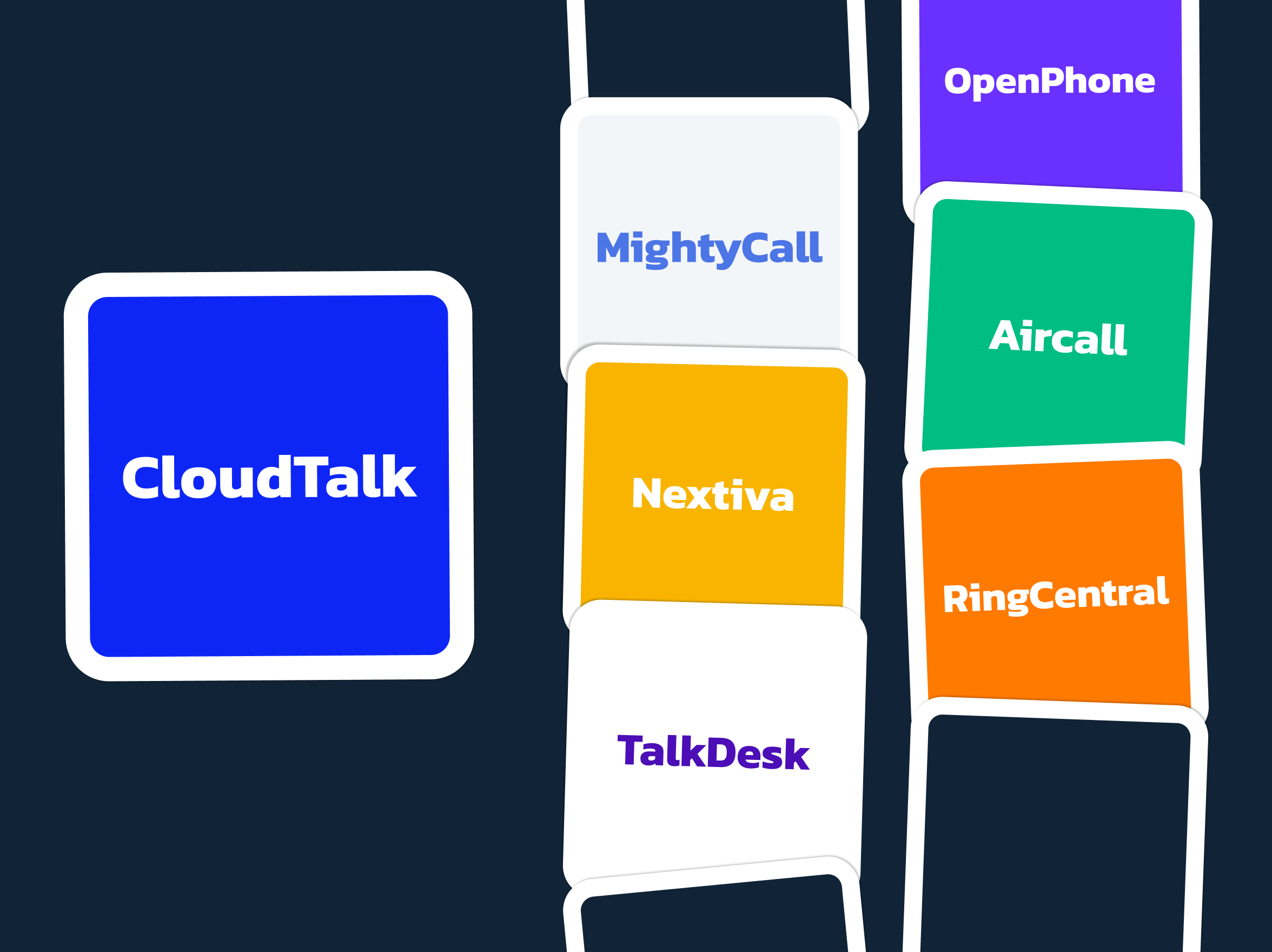CloudTalk is a powerful cloud phone system. However, different users have different requirements, and what works well for one user may not work for another. Users may opt for one of the best CloudTalk alternatives for business that offer similar functionality at a lower cost or choose a different set of features altogether.
This article will help you weigh the pros and cons of using CloudTalk and its top CloudTalk alternatives, compare features, and make an informed decision based on your unique requirements for business call management.
Best CloudTalk alternatives: A comparison
Here is a side-by-side evaluation of alternatives to CloudTalk. Use this table as a starting point to compare the programs before exploring each one in more detail in the sections below.
| Alternative | Price* (lowest tier) | Live call monitoring | Answering machine detection | Auto dialers | G2 user rating |
|---|---|---|---|---|---|
| CloudTalk | $27/month | Yes | Yes | Power | 4.4 |
| MightyCall | $20/month | Yes | Yes | Predictive, power, preview | 4.5 |
| Talkdesk | $75/month | Yes | Yes | Power, predictive | 4.4 |
| JustCall | $24/user | Yes | Yes | Predictive, power, preview | 4.3 |
| Dialpad | $23/month | Yes | No | Salesforce progressive only | 4.4 |
| Nextiva | $25.95/month | Yes | Yes | Preview, progressive, predictive | 4.5 |
| RingCentral | $32.99/month | Yes | Yes | Preview, progressive, predictive | 4 |
| Vonage | $19.99/month | Yes | Yes | Preview, progressive | 4.2 |
| CallHippo | Free alternative | Yes | Yes | Progressive, preview | 4.4 |
| Aircall | $30/user | Yes | No | Power | 4.4 |
| OpenPhone (Quo) | $19/month | No | No | No | 4.7 |
How we evaluated these alternatives to CloudTalk
Here’s what we focused on when ranking all the alternatives:
- Features: While almost every provider offers the basics, such as phone numbers, not all deliver the same quality or variety of services.
- Price and availability: We weighed cost alongside value to see which services truly offer a smart investment.
- Integration options: Many services claim to integrate with popular tools, but the depth and variety of those integrations vary widely.
- Total cost (including add-ons): The price you see isn’t always the price you pay. We factored these hidden expenses into our rankings.
- Call quality: Consistent, crystal-clear communication was a top priority in our evaluations.
- User support: Some free or cheap alternatives look appealing until you need help, then you’re stuck waiting days for a reply.
What is CloudTalk?
CloudTalk is a call center software designed to scale to meet the needs of small teams with just a few support representatives or large organizations with hundreds of employees.
CloudTalk has been selected by a range of well-known brands, including Fujitsu, Revolut, and CoachHub, demonstrating its effectiveness in serving the diverse needs of various industries and business sizes.
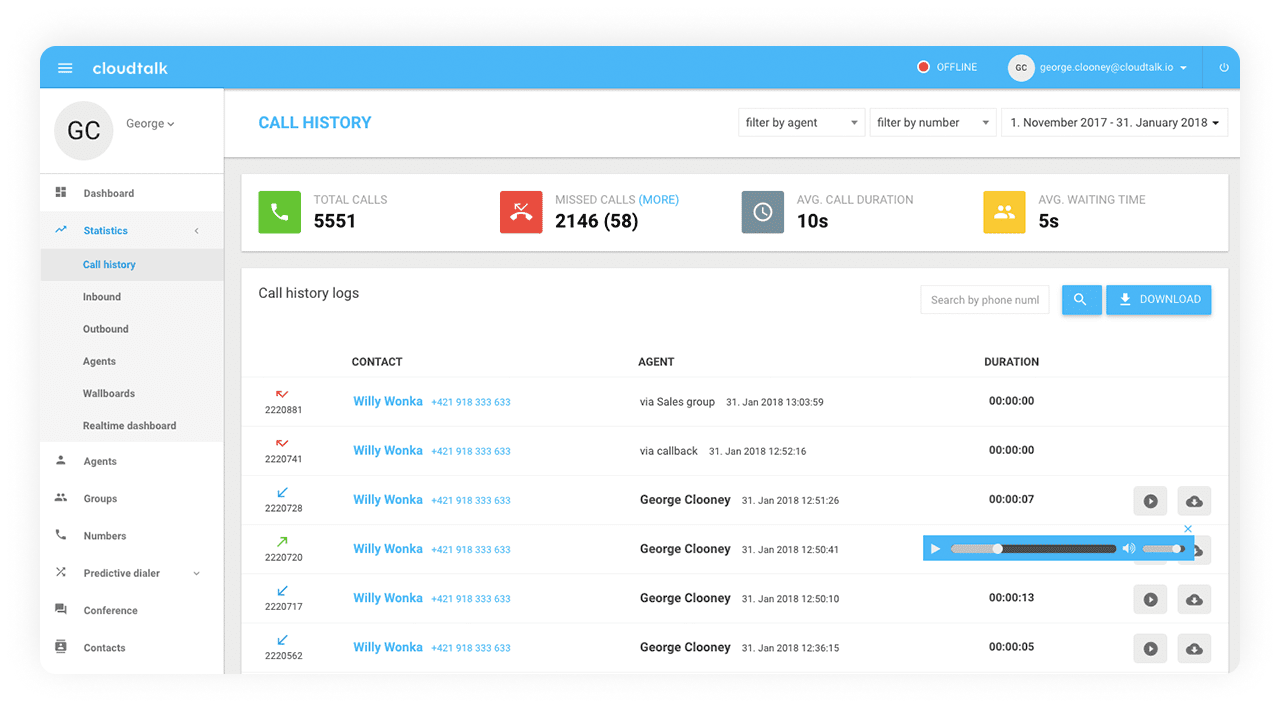
Key features
- Number porting, toll-free, and international numbers
- Personalized greetings & music
- Business hours
- Three-way calling
- Ring groups
- Preferred agent
- Real-time customer card
Integrations
- Pipedrive
- Zendesk
- Kommo
- Zapier
- Help Scout
Pricing
- Lite: $27/user/month
- Essential: $39/user/month
- Expert: $69/user/month
- Custom: Request a quote
Free trial
CloudTalk offers a 14-day free trial.
Why do companies choose CloudTalk?
CloudTalk has become a popular choice for businesses that want a flexible, reliable, and easy-to-manage phone system. Here are the top reasons it stands out:
- Smart features that boost performance: Tools like real-time analytics, call transcription, and intelligent routing help teams work more efficiently and improve the customer experience.
- Global reach: With local numbers in over 160 countries, CloudTalk makes it easy to connect with customers worldwide, without expensive infrastructure.
- Easy to use from day one: Teams praise its simple setup and clean interface, which makes onboarding quick and easy, even for those who aren’t tech-savvy.
- Integrations and security you can trust: CloudTalk connects seamlessly with major CRMs like HubSpot and Zendesk, while meeting top-tier security standards.
Why businesses look for CloudTalk alternatives
CloudTalk has a lot going for it, but it’s not the perfect fit for everyone. Here’s why some teams start searching for CloudTalk alternatives.
Limited features on lower plans
Essential tools, such as IVR menus, SMS messaging, and advanced call routing, are often missing from entry-level plans, which means you’ll need to upgrade for full functionality.
Costs that add up quickly
The base price may seem reasonable, but add-ons like SMS (charged per message) and advanced features can push the total cost higher than expected.
Inconsistent support and reliability
While generally stable, CloudTalk can experience glitches, and some users feel support responses are slower than they’d like.
Set-up and usability complexity
While CloudTalk offers a rich feature set, it comes with a somewhat challenging setup process and a steeper learning curve for some businesses.
10 top alternatives to CloudTalk: An overview
Here is in-depth information and analysis of each alternative service, like CloudTalk, and their unique features, benefits, and drawbacks.
1. MightyCall
MightyCall is one of the best alternatives to CloudTalk. It provides a wide range of tools designed to help businesses reach their full potential. By combining the best features of internet-based phone services, MightyCall delivers a modern solution that enhances customer experience and supports real business growth. You can easily add or remove numbers and users as needed, and customize your call flows for maximum flexibility.
Features
- Fully customizable call routing
- Call recording
- Call queues
- Voicemail-to-text
- Voicemail drop
- Multi-level IVR
- Live call monitoring: call listening, barging, whisper, intercept
- Auto dialers: a 10-line per agent predictive, power, and preview modes
- AI answering machine detection with a 97% accuracy
- Local presence dialing
- Caller ID whitelisting
- Real-time analytics
- AI call summary
- Business phone extensions
- Call recording
- Call waiting
- DID reputation
Integrations
All major CRMs
Pricing
MightyCall offers the following pricing:
- Core: $20/per user/per month, billed annually
- Pro: $38/per user/per month, billed annually
- Power: $65/per user/per month, billed monthly
- Enterprise: Request a quote
Free trial
MightyCall offers a 7-day trial.
Support channels
- Live chat: Receive instant assistance from a support agent through the website chat.
- Phone: Would you prefer to speak with someone? Call MightyCall’s support team at +1 (888) 256-8312, extension 2.
- Email: Reach out anytime at support@mightycall.com.
- Help center: Explore helpful guides or submit a support ticket through the online form.
What makes it better than CloudTalk?
- More user-friendly layout: Users frequently note that MightyCall’s dashboard is more intuitive and provides a smoother experience.
- Better assistance for small and medium-sized teams: Compared to CloudTalk, MightyCall provides hands-on support through its industry-recognized team.
- Advanced dialer options and analytics: MightyCall offers power, predictive (10 lines/agent), and preview dialers, with corresponding dialer analytics that give you detailed insights into your campaigns.
- Superior reliability: High-availability Seamless Redundancy infrastructure ensures zero downtime via synchronized physical servers.
MightyCall limitations
- Limited integration options compared to larger platforms
- No built-in video conferencing
Customer feedback
Rating: 4.4/5 on G2
Many users appreciate MightyCall for its simple setup process, user-friendly interface, and helpful customer support. It’s often praised for being affordable, straightforward, and easy to get started with. However, some users report occasional technical issues.
Best for
MightyCall is most apt for SMBs and call centers.
schedule your personalized demo with our amazing team

2. Talkdesk
Talkdesk is a cloud-based platform similar to CloudTalk, helping businesses improve their customer service operations.
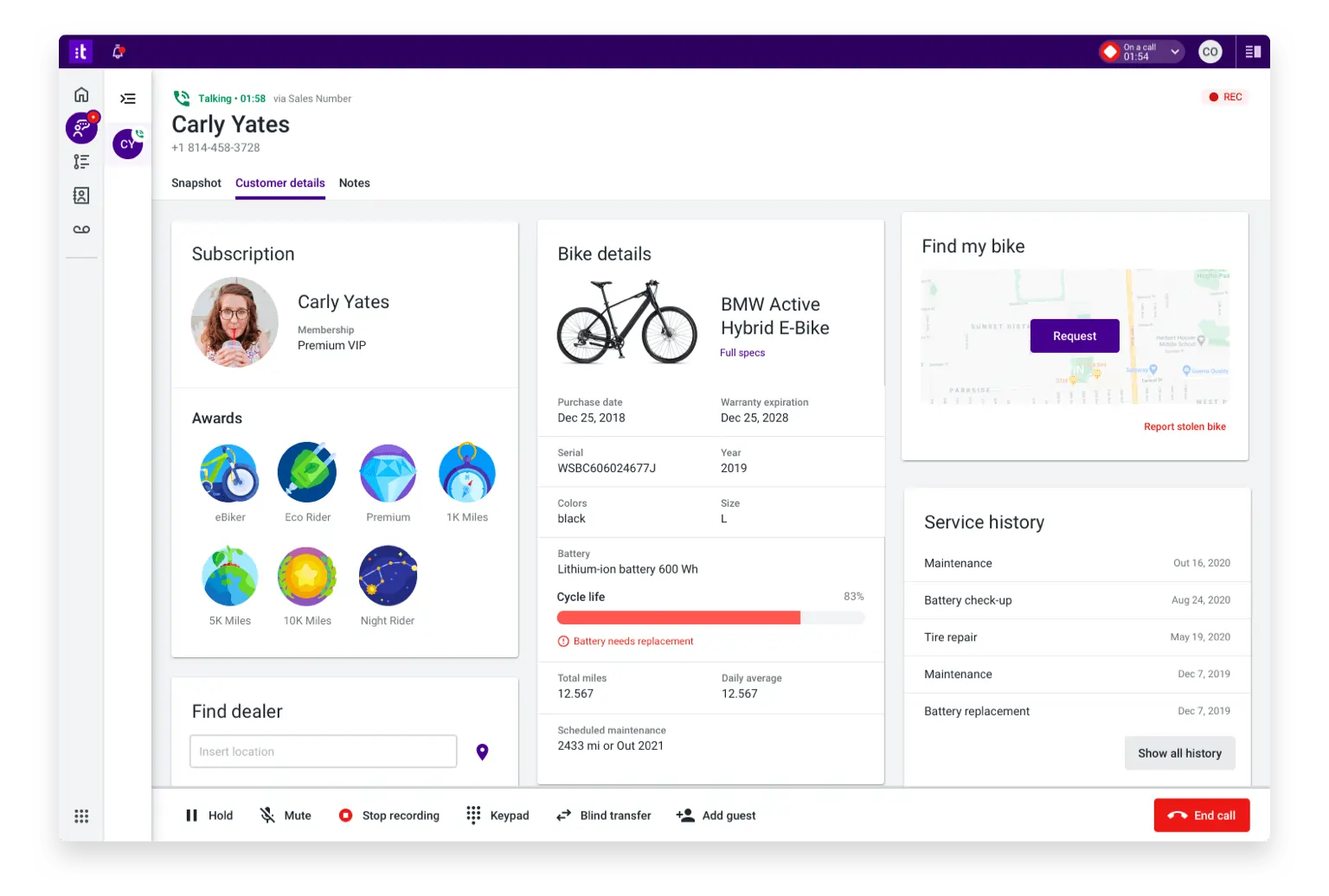
Features
- Automated call flow
- Local presence dialing
- Call whispering
- Call takeover
- Detailed KPI monitoring
Integrations
All major CRMs
Pricing
- CX Cloud Digital Essentials: $85/user/month
- CX Cloud Voice Essentials: $105/user/month
- CX Cloud Elite: $165/user/month
Free trial
There’s a Talkdesk Express 15-day free trial.
Support channels
- 24/7 phone and live chat support for enterprise plans
- Email ticketing system
- Comprehensive Help Center with knowledge articles, videos, and troubleshooting tips
What makes it better than CloudTalk?
- Enterprise-grade scalability: Talkdesk is designed for large organizations with complex needs, offering customizable workflows, automation, and role-based access controls.
- AI-powered tools: Features like Talkdesk AI, Agent Assist, and automated call summaries help streamline operations and improve agent productivity.
- Advanced analytics: Talkdesk offers powerful reporting and real-time dashboards that deliver deep insights into performance and customer experience.
Talkdesk limitations
- Higher price point: Its enterprise-level capabilities come with a higher cost, making it less suitable for small teams or those with budget restrictions.
- Occasional performance issues: Some users have reported experiencing system lags or glitches, particularly during periods of high volume.
- Customization complexity: While flexible, setting up custom workflows or automations may require technical assistance.
Customer feedback
Rating: 4.4/5 on G2
According to G2 reviews, customers appreciate Talkdesk’s rich feature set, powerful AI tools, and reliable performance for large-scale operations.
However, users also point out that the platform can be overwhelming for smaller teams and that implementation may require more time and technical know-how compared to simpler competitors like CloudTalk.
TalkDesk is more complicated than other CCaaS solutions out there. This wasn’t as intuitive or user friendly as other options that I’ve seen, but it wasn’t the most complex either. –
Read the full review
Best for
Talkdesk’s scalable infrastructure and customizable options make it easy for mid-size companies to adapt as they expand.
3. JustCall
JustCall is a cloud-based phone system and calling software that helps businesses make and receive calls from anywhere in the world. Since its founding in 2016, JustCall has been helping businesses of all sizes to streamline their communication processes and boost productivity.
With a user-friendly interface and top-notch customer support, JustCall is a strong competitor to CloudTalk and an ideal choice for businesses seeking an affordable and reliable phone system solution.
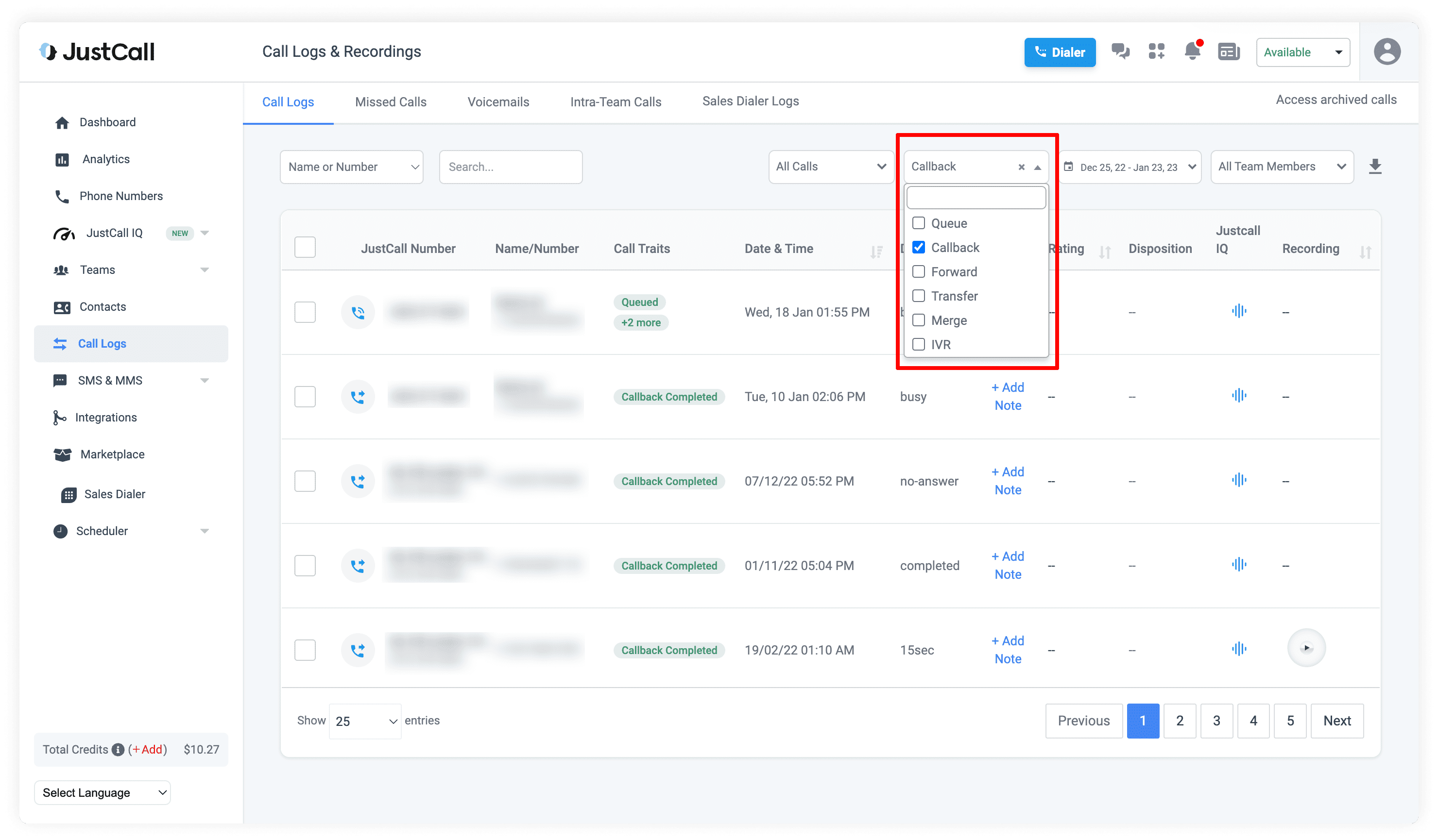
Features
- Virtual phone numbers
- IVR
- Call recording
- Call forwarding
- Power dialer
Integrations
All major CRMs
Pricing
- Standard: $24/user/month
- Premium: $48/user/month
- Enterprise: Custom pricing
Free trial
JustCall offers a 14-day free trial.
Support channels
JustCall provides multiple support options to help users stay productive and solve issues quickly:
- Live chat support is available on the website and within the platform
- Email support for technical and billing-related inquiries
- Knowledge base with detailed help articles and how-to guides
What makes it better than CloudTalk?
- Quicker setup and user onboarding: JustCall is designed for a fast launch, enabling teams to get started with minimal friction.
- More sales-focused features: With built-in tools like SMS automation, sales dialers, and CRM integrations, JustCall appeals more directly to outbound sales teams.
JustCall limitations
- Basic reporting tools: Analytics and reporting are more limited than what’s available on platforms, such as CloudTalk or Talkdesk.
- Occasional call quality issues: Some users have reported call quality issues, which may be dependent on the region or connection stability.
Customer feedback
Rating: 4.3/5 on G2
According to G2 reviews, customers love JustCall’s user-friendly interface, quick setup, and seamless CRM integrations. On the downside, some users highlight the lackluster reporting, occasional bugs, and inconsistent call quality.
At times, I’ve experienced minor lags within JustCall, which can affect the overall responsiveness. –
Read the full review
Best for
JustCall is an ideal solution for small and medium-sized businesses that require a reliable and affordable cloud-based phone system with advanced CRM integrations. It’s also an excellent option for remote teams or companies with a distributed workforce, thanks to its mobile and web accessibility.
4. Dialpad
Dialpad is another top alternative to CloudTalk. Their flexible and robust business phone service offers different solutions to address various business needs. Its solutions include AI Call Center, AI Sales, AI Voice, and AI Meetings, allowing companies to choose a package that’s tailored to their needs.
Dialpad is also known for its fast-paced product releases, with new features, integrations, and acquisitions being automatically rolled out on a regular basis.
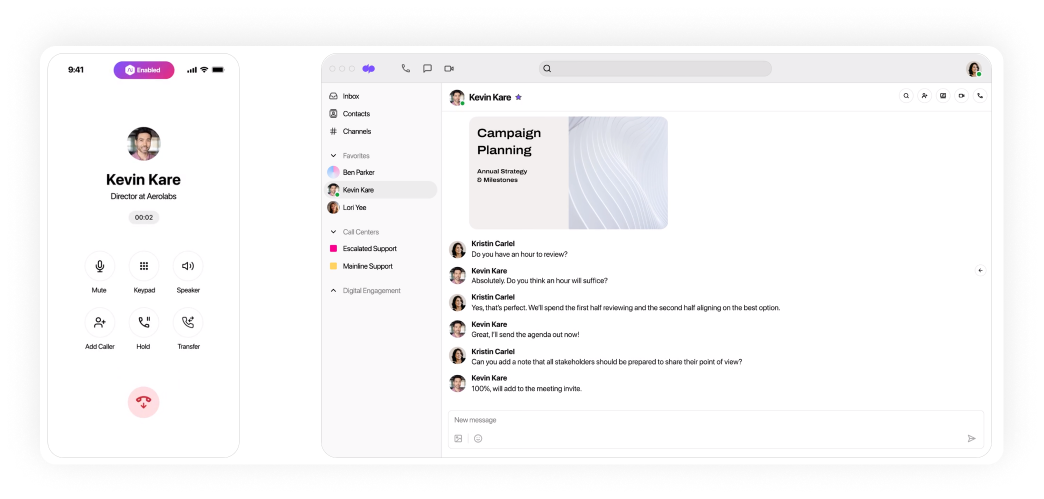
Features
- Virtual receptionist
- HD conference calls
- Power dialer
- Visual voicemail
- Contact center analytics
Integrations
All major CRMs
Pricing
- Standard plan: $27/month
- Pro plan: $35/month
- Enterprise package: Request a quote
Free trial
Dialpad offers a 14-day free trial.
Support channels
- Live chat: Available to all customers during standard business hours.
- Email support/ticketing: Customers can submit support tickets via Dialpad’s Help Center for non-urgent issues.
- Help center: A self-service portal with comprehensive guides, FAQs, tutorials, and setup documentation.
- AI-powered virtual assistant: Integrated into the Help Center to assist with basic troubleshooting and navigation.
What makes it better than CloudTalk?
- AI-powered call insights: Dialpad’s standout feature is its built-in AI, offering live call transcriptions, sentiment analysis, and real-time coaching tools that CloudTalk doesn’t provide.
- Unified communications platform: While CloudTalk focuses mainly on voice, Dialpad integrates voice, video meetings, and team messaging in a single interface.
- Simpler interface and faster setup: Dialpad is recognized for its user-friendly design, which helps teams get up and running with minimal friction.
Dialpad limitations
- CRM integration is somewhat limited: While it works well with major CRMs like Salesforce and HubSpot, its integration ecosystem is smaller than CloudTalk’s.
- AI features may feel excessive for basic use cases: Small teams that don’t need advanced insights may find the AI tools unnecessary.
- Limited phone support for entry-level plans: Users on standard plans may need to rely on chat or email support instead.
Customer feedback
Rating: 4.4/5 on G2
Users consistently highlight Dialpad’s clean interface, powerful AI features, and smooth performance as major strengths. It’s often praised for helping teams save time and improve call outcomes. However, some users mention limited CRM integration depth and occasional inaccuracies in transcriptions.
There are times where phone calls may ring on the connected cell phones and we are unable to answer. 95% of the time it works, but there are times where we cannot connect and have to call back the customer. –
Read the full review
Best for
Dialpad can meet the needs of businesses of various sizes.
5. Nextiva
Nextiva is a cloud-based phone service, similar to CloudTalk, designed to help teams work more efficiently across projects.
The platform boasts a 99.99% uptime, ensuring that businesses can rely on its services to be available when needed. This high level of reliability ensures that businesses can communicate with customers, partners, and team members without interruption.
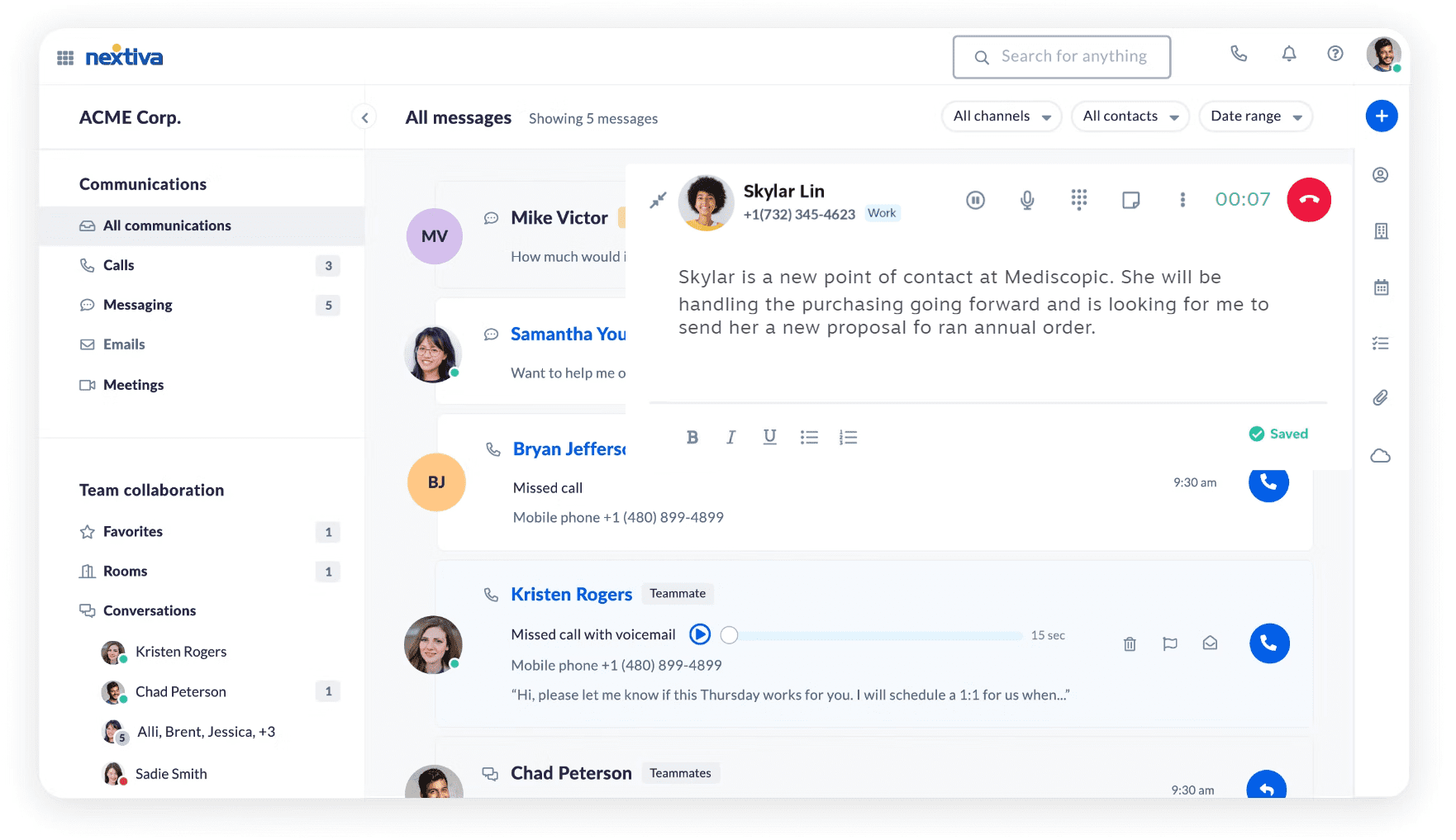
Features
- Advanced call management
- Call queuing and pulling
- Voicemail to text and email
- Hosting a PBX phone system
Integrations
All major CRMs
Pricing
- Core: $23/month
- Engage: $50/month
- Power Suit CX: $75/month
Free trial
Nextiva offers a 7-day free trial.
Support channels
- 24/7 phone support
- Live chat and email
- A comprehensive knowledge base and video tutorials
What makes it better than CloudTalk?
- Greater service reliability: With its own nationwide VoIP infrastructure, Nextiva offers excellent uptime and call quality.
- More features under one roof: Beyond voice, Nextiva includes video conferencing, team messaging, fax, and surveys, eliminating the need for multiple tools.
- Strong customer support: Nextiva is known for responsive, 24/7 U.S.-based support. That’s an area where CloudTalk has received mixed reviews.
Nextiva limitations
- Can be overkill for small teams: Smaller businesses might find Nextiva’s enterprise-level capabilities more than they need.
- Less intuitive for non-technical users: Navigating features and customization options can be time-consuming without technical assistance.
Customer feedback
Rating: 4.5/5 on G2
On G2, users highlight Nextiva’s comprehensive feature set, call reliability, and helpful customer service as major pluses. Many appreciate that it’s a one-stop shop. However, some note that CloudTalk offers more flexible international options and that Nextiva’s learning curve can be steeper for small teams or first-time VoIP users.
Very rarely, but I have experienced that the app on my mobile device signed me out of my account when I hadn’t used it for a long period of time. (2 weeks and more) –
Read the full review
Best for
Nextiva is best suited for startups and small businesses.
6. RingCentral
RingCentral is another competitor. It’s a cloud-based communications and collaboration platform, similar to CloudTalk, that offers a range of services operating over the internet, eliminating the need for traditional phone lines and hardware.
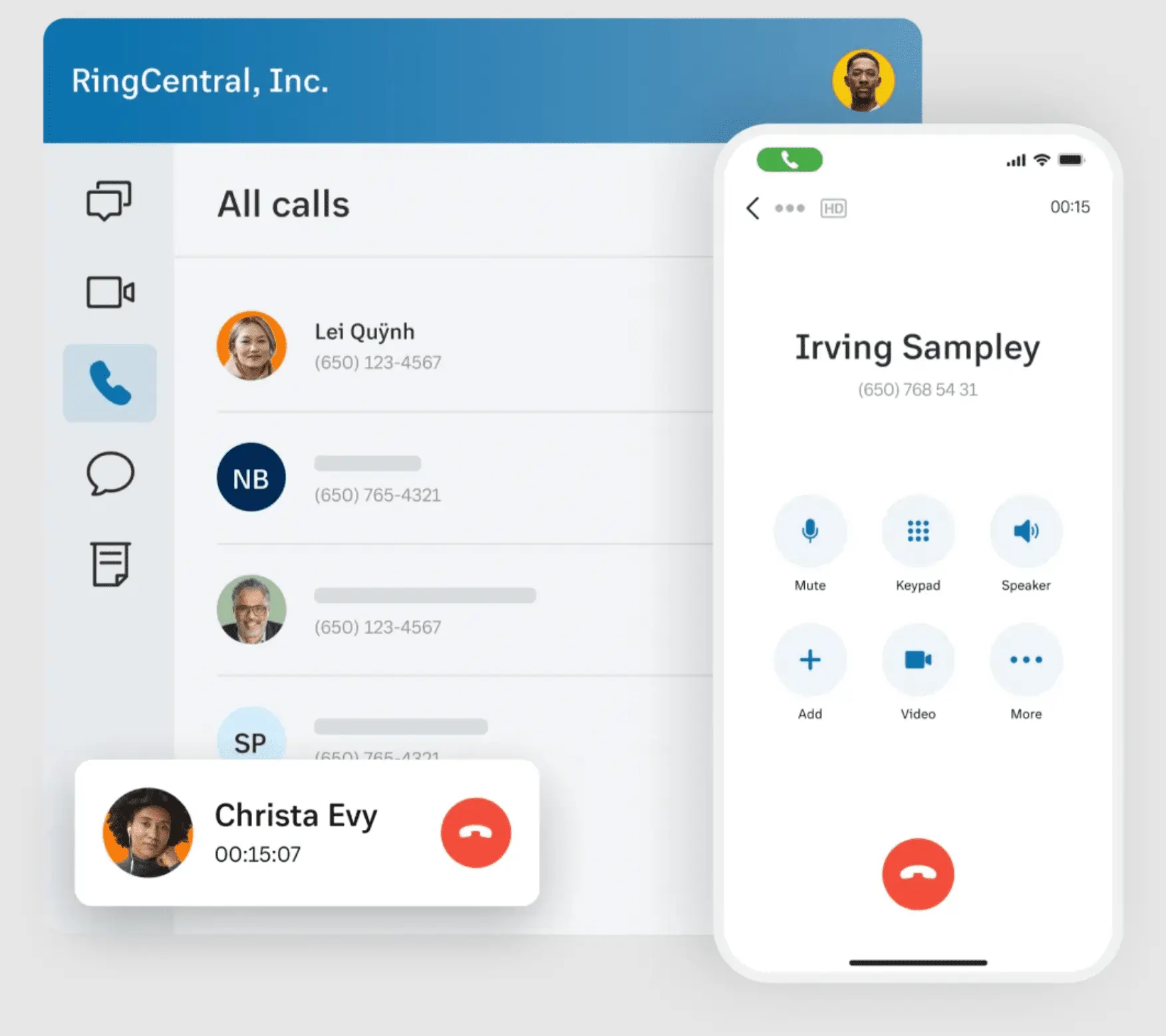
Features
- Call delegation
- Presence and head-up display
- Greetings
- Caller ID and directory listing
- Analytics portal
Integrations
All major CRMs
Pricing
- Core: $30/user/month
- Advanced: $35/user/month
- Ultra: $45/user/month
Free trial
There’s a 14-day free trial.
Support channels
- 24/7 phone and chat support for all users
- Email ticketing system
- Extensive knowledge base with articles, how-tos, and videos
What makes it better than CloudTalk?
- Unified communications platform: RingCentral offers voice, video, SMS, team messaging, and even fax, whereas CloudTalk is primarily voice-focused.
- Better suited for large teams: With advanced admin tools, role-based access, and call center-grade features, RingCentral supports larger, distributed organizations more effectively.
RingCentral limitations
- Steeper learning curve: The extensive feature set may be more than smaller teams require, making setup and training more time-consuming.
- Costlier at scale: While powerful, the pricing can increase rapidly as teams expand and require access to advanced features.
- Interface not as modern: Some users believe the platform’s UI could benefit from a more modern and streamlined design.
- Occasional support bottlenecks: Users have reported inconsistent support experiences, particularly on standard support plans.
Customer feedback
Rating: 4/5 on G2
G2 reviewers often appreciate RingCentral’s versatility, global reach, and advanced feature set, especially when compared to CloudTalk’s more voice-centered approach. On the downside, some feel that it’s not that easy to set up and manage for small to mid-sized teams.
Sometimes it gets a little bit slow but its no very common. –
Read the full review
Best for
RingCentral meets the needs of medium-sized businesses and larger enterprises.
7. Vonage
Vonage is similar to companies like CloudTalk. It unifies global business communication channels to work better together. The platform provides a comprehensive suite of voice, video, messaging, and contact center solutions, allowing organizations to streamline their communication and collaboration processes.
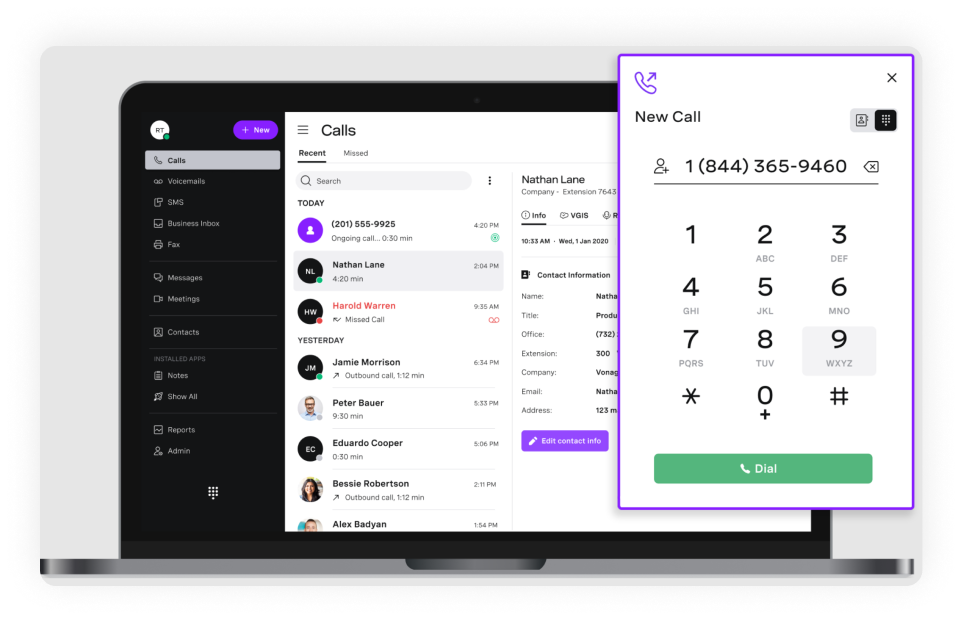
Features
- Multi-line business phone
- Receptionist console
- Call announce
Integrations
All major CRMs
Pricing
- Mobile Plan: $19.99/month
- Premium Plan: $29.99/month
- Advanced Plan: $39.99/month
Free trial
There is a try-for-free option, but it doesn’t specify the potential time frame of the trial.
Support channels
- 24/7 phone support for urgent technical issues.
- Live chat during business hours.
- Email and ticketing system.
- Help Center with detailed guides, FAQs, and video tutorials.
What makes it better than CloudTalk?
- More than just voice: While CloudTalk is voice-centric, Vonage adds video, messaging, and conversational AI capabilities, making it more adaptable for omnichannel needs.
- Customizable via APIs: Vonage is a favorite among tech-savvy teams.
- Stronger international support: Vonage offers better global reach with extensive local number availability and reliable international call quality.
Vonage limitations
- Less user-friendly setup: For teams used to CloudTalk’s ease of onboarding, Vonage might feel complex, especially when APIs are involved.
- Not ideal for small businesses: Some features and tools are more tailored for mid-size to large enterprises.
- Limited integrations: CloudTalk shines in pre-built integrations; Vonage may require more manual setup or API work to connect tools.
Customer feedback
Rating: 4.2/5 on G2
G2 reviewers often highlight Vonage’s versatility, customizability, and global infrastructure as clear strengths over CloudTalk. However, they point out that Vonage doesn’t offer a more beginner-friendly interface compared to other competitors, which provide a smoother setup.
I dislike that sometimes the phone has a weird connection and will either delay in alerting me of a call coming through OR the call will not come through at all, I look down and have a missed call. I’ve had to reach out to support about this several times, thankfully they’ve been super helpful/ –
Read the full review
Best for
Vonage is suitable for businesses of all sizes, whether they are small startups or large corporations.
8. CallHippo
CallHippo is a phone system that provides businesses with a range of tools to deliver a smooth customer experience. The service can be set up and running in under three minutes due to its cloud-based nature. Businesses across various industries, including recruitment and finance, can easily sign up for an account and select their virtual business phone number.
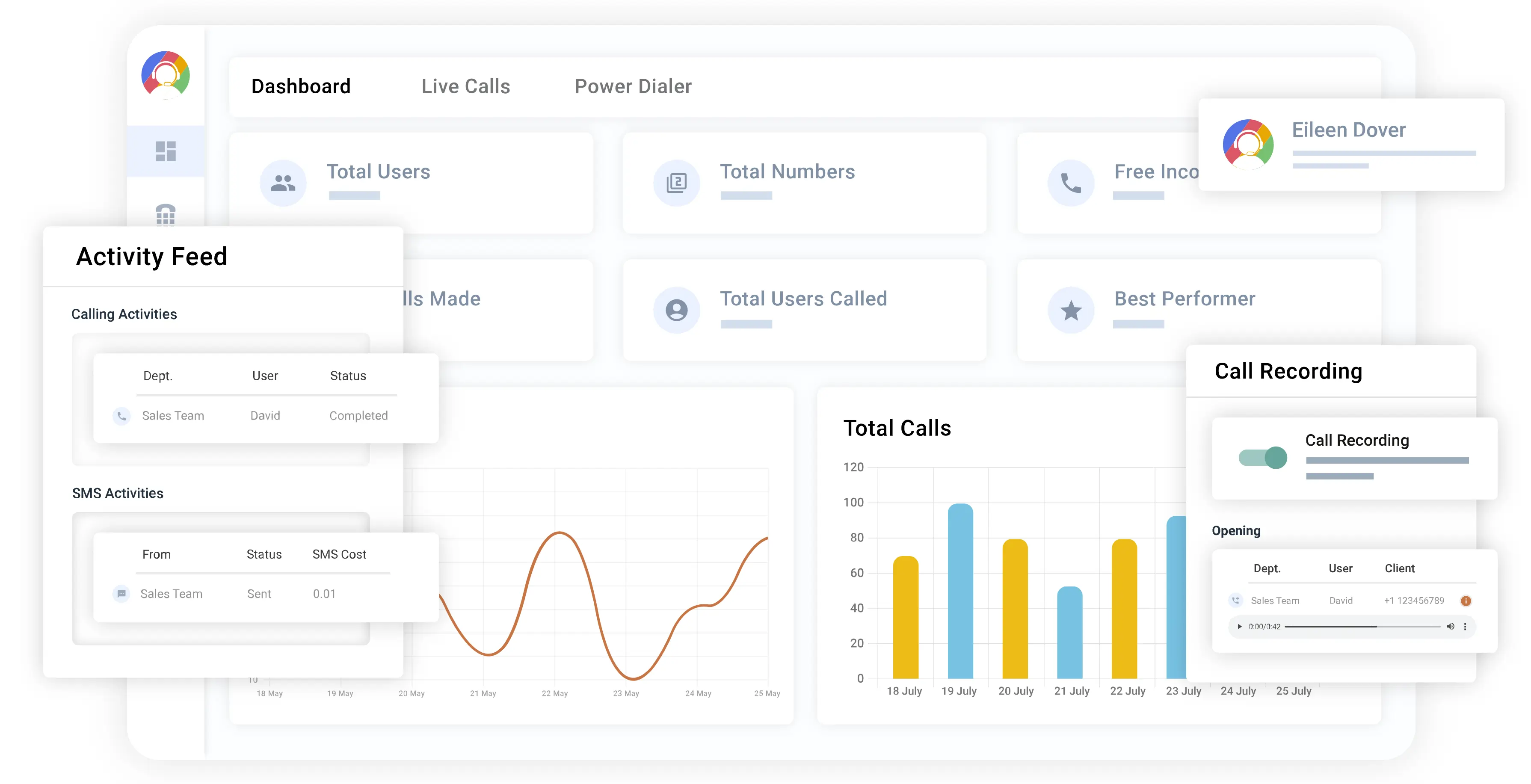
Features
- Interactive Voice Response
- User-role system
- Voice broadcast system
- Call screening and blocking
- Post-call surveys
Integrations
All major CRMs
Pricing
- Basic: A free alternative
- Bronze: $40/user/month
- Silver: $50/user/month
- Platinum: $60/user/month
- Enterprise: Request a quote
Free trial
CallHippo does not offer a free trial specifically. However, they have a basic free option.
Support channels
- Email and ticket-based support
- Live chat during standard business hours
- Help center with FAQs, setup guides, and video tutorials
- Phone support for premium users
What makes it better than CloudTalk?
- Faster implementation: CallHippo offers a quicker setup and onboarding time compared to CloudTalk, which can require more configuration. This option is better than CloudTalk in that sense.
- Lower entry-level pricing: It offers more cost-effective plans for teams just getting started with VoIP solutions.
- Simple, clean interface: CallHippo’s design is more approachable for non-technical users, whereas CloudTalk can feel overwhelming at first.
- Real-time call features: Features like call barging and whispering are more readily accessible on lower-tier plans than with CloudTalk.
CallHippo limitations
- Scalability issues: As businesses grow, some users find CallHippo’s features too limited compared to CloudTalk.
- Fewer integrations: It lacks the wide range of plug-and-play integrations that CloudTalk offers for CRM, helpdesk, and productivity tools.
- Inconsistent call reliability: Call quality may fluctuate during peak hours.
- Basic analytics and reporting: Teams needing deep performance tracking may find the platform lacking in reporting capabilities.
Customer feedback
Rating: 4.4/5 on G2
G2 users often highlight CallHippo’s affordability, ease of use, and responsive UI. On the other hand, CallHippo is not always the preferred choice for larger teams that require stronger analytics, call routing customization, and broader integrations.
Some minor bugs or glitches occasionally affected call quality or feature performance –
Read the full review
Best for
This free alternative is a comprehensive communication solution that is well-suited for organizations of all sizes, from small businesses to large enterprises.
9. Aircall
Aircall is a contact center software that is easy to set up and use, even for high volumes of calls. Its features enable businesses to optimize their sales and support workflows, resulting in improved customer experiences and increased sales.
The setup doesn’t require technical consultants or special equipment. All that is required is a computer, a headset, and an internet connection.
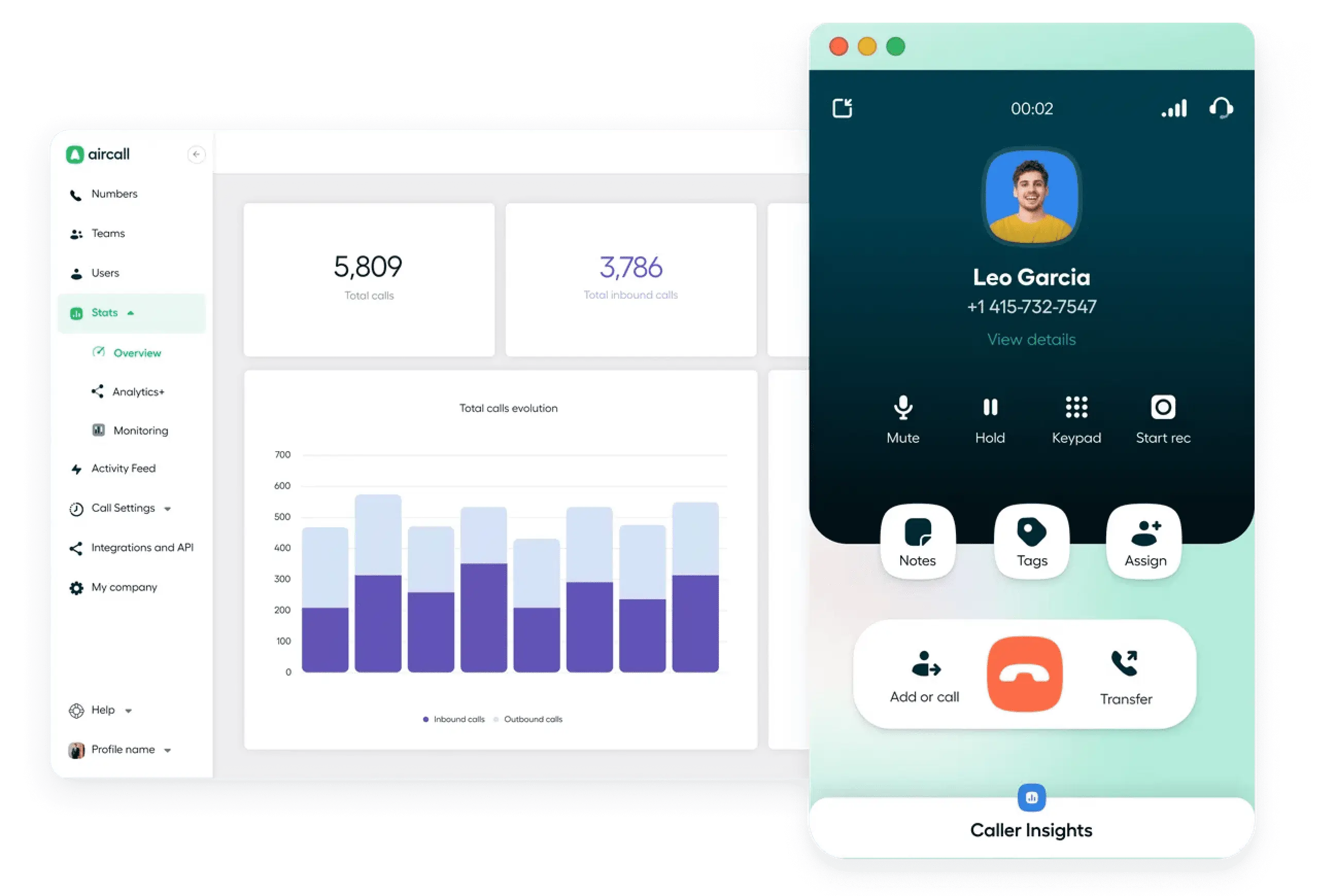
Features
- Three-digit extensions
- Call monitoring and whispering
- Shared contacts and call inbox
- Alerts and notifications
- Activity feed
Integrations
All major CRMs
Pricing
- Essentials: $40/license/month
- Professional: $70/license/month
- Custom: Personalized quote and custom features
Free trial
Aircall offers a 7-day free trial.
Support channels
- Live chat and email support during business hours
- Help center with detailed articles, setup guides, and FAQ
- Onboarding and training sessions for new customers
- Priority support and account management for premium plans
What makes it better than CloudTalk?
- Superior user interface: Aircall offers a cleaner, more intuitive UI that’s easier for teams to adopt and navigate, with minimal onboarding required.
- Built for sales and support workflows: Aircall’s features, including click-to-dial, call tagging, and call coaching, are optimized for teams that need quick and efficient workflows.
Aircall limitations
- Pricing may not suit small businesses: Aircall’s plans are relatively pricey for startups or teams with tight budgets.
- Limited customization: Unlike CloudTalk, which offers more flexibility in call routing and IVR flows, Aircall’s system can feel rigid for more complex needs.
- Feature depth may be lacking: For advanced users, Aircall may not offer the same depth in reporting and analytics as CloudTalk.
Customer feedback
Rating: 4.4/5 on G2
According to G2 reviewers, Aircall is praised for its ease of use, reliable integrations, and clean interface, especially for sales and support environments. However, users also mention that it can be expensive compared to alternatives and lacks some of the customization or analytics depth found in other platforms.
It may happen that call quality varies depending on the internet connection, which can be inconvenient during important conversations. Furthermore, some advanced integrations require a higher plan, and the cost can then quickly increase for small businesses. –
Read the full review
Best for
As a CloudTalk competitor, Aircall can be a good fit for small businesses, mid-sized organizations, and large enterprises.
10. OpenPhone (Quo)
OpenPhone (Quo) is a cloud-based business phone system similar to CloudTalk that aims to simplify business communication and improve collaboration by providing an all-in-one solution for businesses of all sizes.
OpenPhone (Quo) offers a fresh take on the traditional phone system, providing a platform that is both simple and familiar, while also introducing new and innovative features that help businesses stay connected and communicate more effectively.
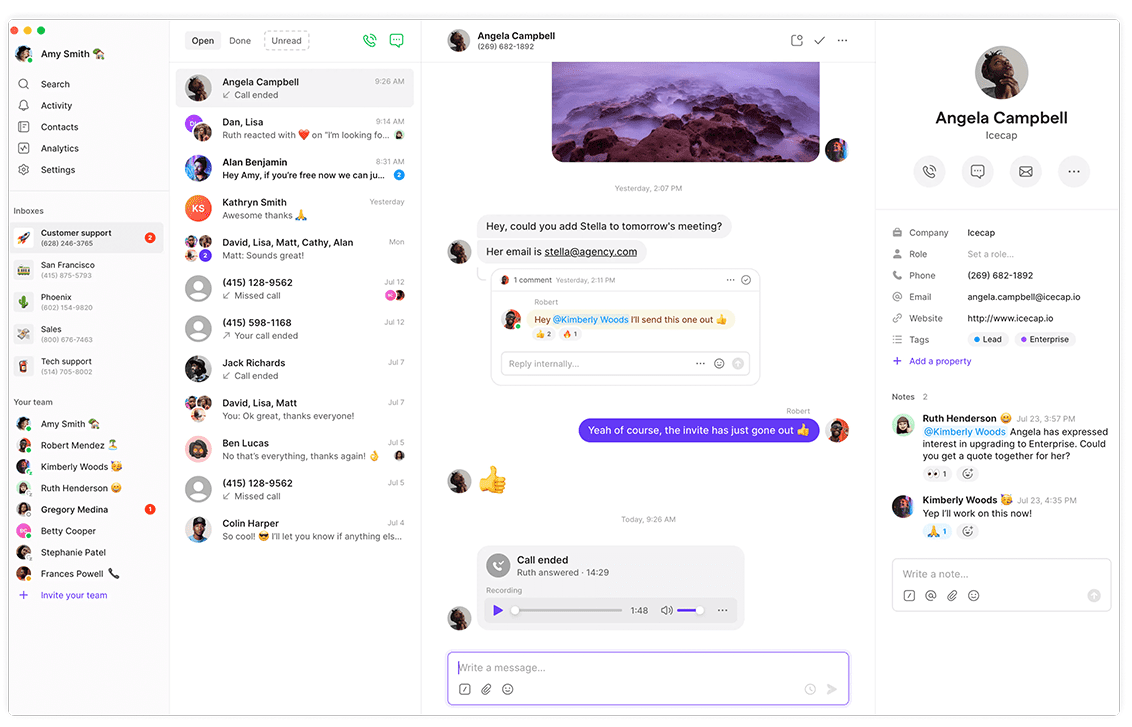
Features
- IVR and forwarding
- Custom properties on contacts
- Caller context
- Voicemail and after-hours voicemail
- CSV import for contacts
Integrations
All major CRMs
Pricing
- Starter: $19/user/month
- Business: $33/user/month
- Scale: $47/user/month
- Sona: $49/month/50 calls
Free trial
OpenPhone (Quo) offers a 7-day free trial.
Support channels
OpenPhone (Quo) provides support through:
- Email support for troubleshooting and general inquiries
- Live chat within the platform
- Help Center with FAQ, setup guides, and feature documentation
What makes it better than CloudTalk?
- Simpler, cleaner interface: Quo excels with its minimalist, user-friendly design—ideal for teams that want to avoid feature overload.
- Built-in SMS and MMS messaging: Unlike CloudTalk, Quo integrates texting directly into the workflow, supporting business conversations across channels.
- Shared inboxes for collaboration: Teams can manage calls and texts from the same business number, improving response times and visibility.
- More affordable for small teams: Quo’s pricing structure is especially appealing to startups or lean businesses looking to scale gradually.
OpenPhone (Quo) limitations
- Limited international features: Number availability and international calling support are more restricted.
- Fewer third-party integrations: While it supports tools like HubSpot and Zapier, its integration ecosystem isn’t as extensive.
- Basic analytics: Reporting tools are relatively basic compared to those of more advanced VoIP platforms.
Customer feedback
Rating: 4.7/5 on G2
Users on G2 love Quo’s intuitive interface, affordability, and seamless texting capabilities, especially for teams that need a simple business line. However, some customers note that it’s better suited to smaller teams and lacks the feature depth or scalability required for larger, more complex operations.
There are a few areas where I think it could improve, especially when it comes to reporting. For example, I’d love to see the ability to schedule reports to be sent via email automatically, right now it manual. It would also be helpful if reports included more context, like employee names or IDs, so it’s easier to track activity across the team. –
Read the full review
Best for
It may work better for SMBs as it offers features that cater to the needs of smaller organizations.
How to choose the right CloudTalk alternative?
Finding the right alternative depends on what your business truly needs from a VoIP, call center, or dialing solution. Finding an alternative that’s better than CloudTalk is even more challenging. With numerous tools available on the market, it’s essential to thoroughly evaluate each option. Here are key factors to consider:
- Feature set: Ensure the platform provides the specific tools your team relies on, such as call recording, IVR, auto-dialing, and SMS support. Some CloudTalk alternatives may specialize in sales outreach, while others are better for customer support.
- Ease of use: A user-friendly interface can significantly reduce onboarding time and help your team stay productive. Look for platforms with intuitive dashboards and simple workflows.
- Integration capabilities: Check whether the service integrates with your CRM, helpdesk software, or productivity tools. Seamless integration can automate tasks and reduce manual data entry.
- Call quality and reliability: VoIP services vary in call stability. Prioritize providers known for high uptime and clear audio, especially if your business relies on real-time communication.
- Scalability: Choose a solution that can grow with your business. Whether you’re adding users or expanding to new regions, the system should handle increasing demands without complications.
- Pricing and value: Look beyond the monthly fee. Compare what each plan includes. Some providers charge extra for essential features, while others offer better all-in-one pricing.
- Customer support: Responsive support can make a significant difference, especially during setup or when encountering technical issues. Check for 24/7 assistance or dedicated account management if needed.
Wrapping up: CloudTalk alternatives worth considering
The best business phone system is the one that truly fits your needs, not just today, but as your company continues to evolve. CloudTalk offers plenty of useful features, yet alternatives to CloudTalk may provide stronger integrations, broader communication channels, or better value for money.
Exploring different providers ensures you find a solution that keeps your team productive and your customers happy. For a flexible, user-friendly option with fantastic call features, MightyCall is one of the best CloudTalk alternatives for businesses to explore. It’s built to deliver reliable performance without unnecessary complexity, so you can focus on running your business.



